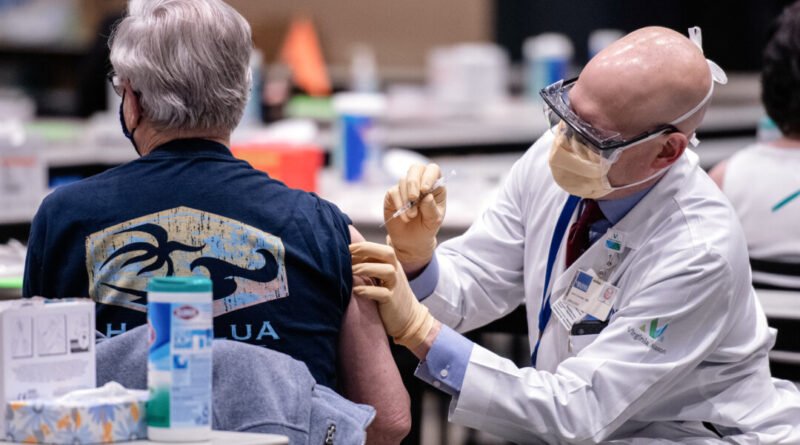Study Finds Nearly 50% of Health Care Workers Unsure About COVID-19 Booster Shots
Six health care workers reported experiencing negative adverse effects after receiving COVID-19 shots in the report.
In a study conducted in Poland, approximately half of the health care workers were hesitant to take COVID-19 booster shots. One of the reasons for this hesitancy was their previous negative experiences with vaccinations.
The peer-reviewed study published in the Vaccines journal on April 29 examined the underlying factors contributing to “hesitancy to receive COVID-19 booster vaccine doses” among health care workers (HCW) in Poland. The study found that almost 50 percent of participants were wary of the boosters. “Our study revealed that 42 percent of HCWs were hesitant about the second booster dose, while 7 percent had no intention of receiving any additional doses.”
“Participants cited reasons such as lack of time, negative experiences with previous vaccinations, and immunity from past infections as reasons for not getting vaccinated.”
The study included 69 healthcare workers, consisting of nurses, midwives, physicians, other health associate professionals, and administrative staff.
At the time of enrollment, 47 participants had a history of lab-confirmed COVID-19 infection, and 31 had at least one comorbidity.
Over 92 percent of the participants received at least one vaccine booster, with 50.73 percent receiving two doses. Five of the 69 HCWs did not receive any boosters.
“Booster hesitancy was lower among health professionals such as physicians, nurses, and midwives compared to administrative staff and others. About 79 percent of physicians received two COVID-19 vaccine booster doses. However, approximately half of HCWs from each occupation group were hesitant about the second booster dose.”
“The highest number of HCWs without any vaccine boosters were observed among administrative personnel.”
HCWs in the age groups of 31-40 and 41-50 were most skeptical about taking the second booster shot. Thirty-four HCWs provided reasons for their hesitancy to receive COVID-19 booster vaccines.
Two health care workers who did not receive booster shots based their decision on personal experiences with vaccines.
“They reported negative experiences with past COVID-19 vaccinations and believed that natural immunity acquired after SARS-CoV-2 infection could protect them against COVID-19, which they perceived as posing no serious health risks,” the study noted.
“Responses from HCWs who received only one COVID-19 booster dose were categorized into two themes: influences based on personal perceptions of the COVID-19 vaccine and disease prevention, and issues related to vaccine safety.”
Six health care workers reported experiencing negative adverse effects after previous COVID-19 vaccinations. Four had safety concerns regarding the vaccines.
In an earlier study, the researchers found that COVID-19 antibody levels among HCWs decreased by approximately 90 to 95 percent within seven months of vaccination, despite none of the HCWs contracting COVID-19.
The study was funded by the Institute of Bioorganic Chemistry Polish Academy of Sciences, and the authors reported no conflicts of interest.
Vaccine Concerns, Harms
Other studies have explored vaccine hesitancy among health care workers. A study from March 2023 that focused on HCWs from Cameroon and Nigeria found that COVID-19 vaccine hesitancy was high and influenced by perceived risks of COVID-19 and its vaccines on personal health, mistrust in COVID-19 vaccines, and uncertainty about colleagues’ acceptance of vaccines.
An April 2022 study found that concerns about vaccine side effects and the belief that vaccines were inadequately studied were key reasons for vaccine hesitancy among health care workers.
A May 2022 analysis in BMJ Global Health warned that mandating vaccination policies could potentially do more harm than good.
“Current mandatory vaccine policies may not be scientifically sound and could potentially cause more harm than good,” the analysis stated.
“Mandating vaccines should be done sparingly and carefully to maintain ethical standards and trust in institutions.”
During a roundtable discussion on COVID-19 vaccines led by Sen. Ron Johnson (R-Wis.) on Feb. 26, researcher Raphael Lataster from the University of Sydney claimed that data from Pfizer and Moderna COVID-19 vaccine clinical trials exaggerated the vaccines’ efficacy.
Lataster stated that this data exaggeration could make an ineffective vaccine appear up to 48 percent effective.
An earlier review found that repeated COVID-19 vaccinations might increase the likelihood of COVID-19 infections and other health issues, potentially causing harm.
“While booster doses have been recommended to improve immunity, especially against new variants, this recommendation lacks proven efficacy, and side effects have been overlooked,” the paper stated.
In an interview with EpochTV’s “American Thought Leaders” program, clinical pathologist Dr. Ryan Cole attributed an increase in cancers to DNA contamination in some COVID-19 vaccines.
“Solid tissue cancers have been observed at rates not seen before, with patients experiencing a resurgence of cancer that is unresponsive to standard treatments,” he said.



